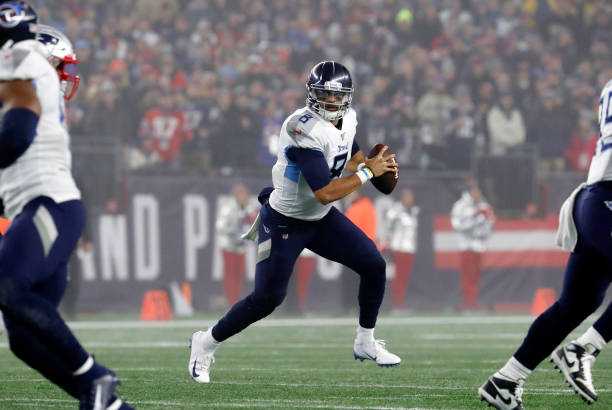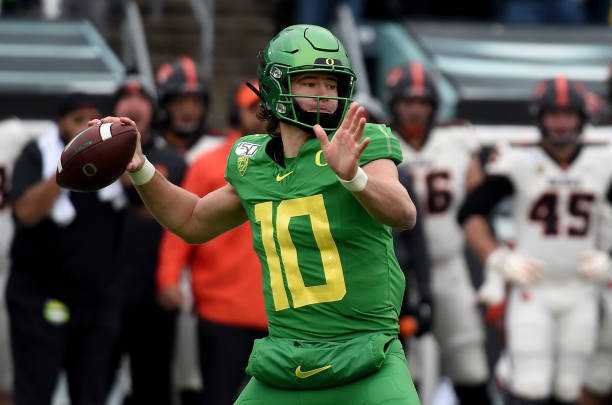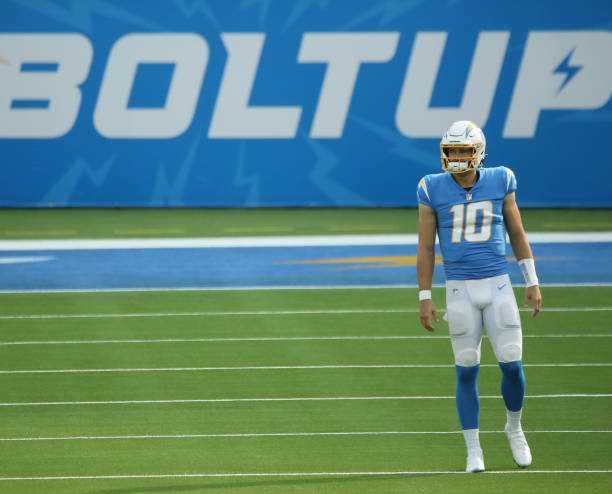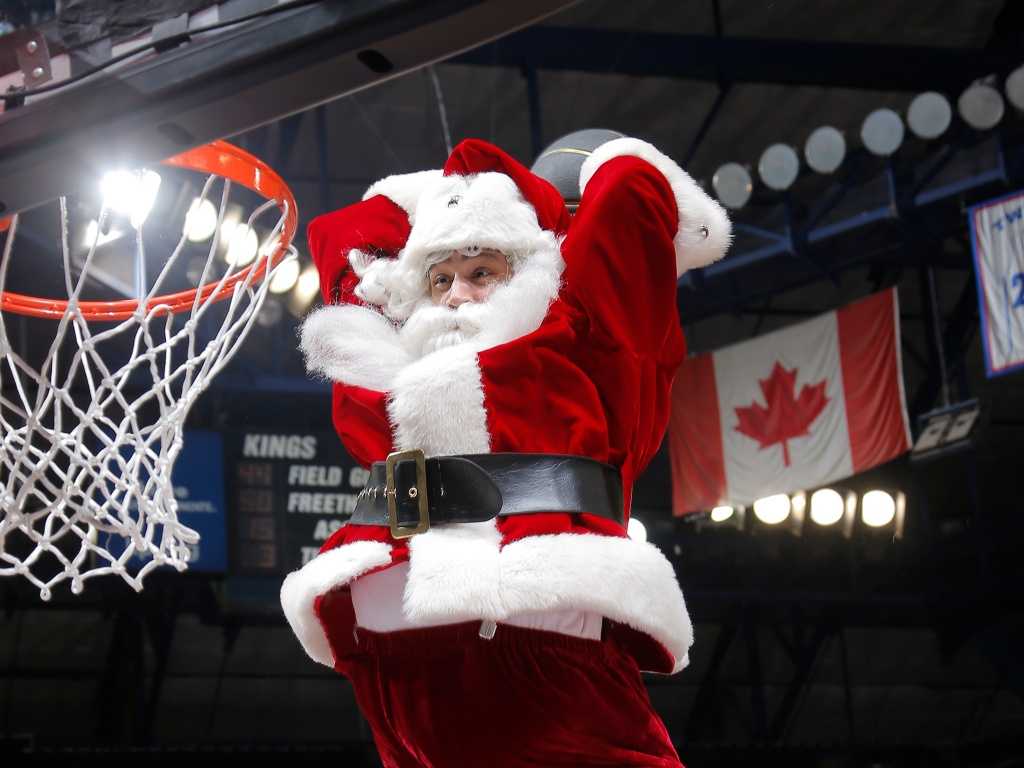I remember where I was when it happened.
I’d graduated from the University of Oregon the previous spring, and my family and I were visiting my brother in Brooklyn. We gathered around the living room of his Williamsburg apartment before dinner and turned the TV on to watch one of the biggest Oregon sports moments of my lifetime. That December night in 2014, just a few short miles away from where the ceremony was taking place in Times Square, we watched with glee as Marcus Mariota won the Heisman Trophy.
It didn’t come as a surprise. It didn’t take us to get a research proposal writing service to know exactly what we were about to witness. We knew exactly what was going to happen. That didn’t lessen the impact in the slightest. The star we’d watched for three seasons, responsible for some of the best moments in program history, finally got the recognition we all knew he deserved. He thanked his family and teammates and praised his Ohana. Telling the audience that everyone from Hawaii shared in his moment, he was emotional. We were all emotional.
These Are the Moments That Make Sports Transcendent
2014 was the first year of the College Football Playoff. That season, the Ducks, led by Mariota, demolished Jameis Winston and the Florida State Seminoles in the College Football Semi-Final before losing to Ohio State in the National Championship. Despite the heartbreak of watching my alma mater fall just short of sports immortality, I’m able to look back now and appreciate that season for what it was, historic.
The Ducks don’t get players like Mariota. We’ve had NFL success stories like Dan Fouts, Haloti Ngata, and Patrick Chung. We’ve had household names like De’Anthony Thomas and LaMichael James; collegiate stars that ultimately flamed out before their professional breakthrough. Mariota was going to shatter both molds. He was going to be the rare player from Eugene who wouldn’t just go to the next level and succeed, but who would become one of the faces of professional football. The greatest Duck of all time was going to be one of the top picks in the NFL draft, and from there, the sky was the limit.
…

Draft night came and went without any surprises. Mariota went second overall to the Titans. Despite Tennessee being in a state of flux at the time of the draft, they had enough pieces to warrant true excitement with the addition of what they believed was a future star in the league. The rest, for the sake of Mariota and the Titans, is history.
Mariota played five seasons with the Titans before becoming a free agent after the 2019-20 season. Not counting the 2019 season wherein Ryan Tannehill was under center for the majority of the year, they went to the playoffs once. They won just one playoff game. During Mariota’s tenure, injuries were inescapable. So too, was organizational turmoil. Tennessee went through four offensive coordinators and three head coaches in his five seasons with the team. Could fortunes have been altered had Tampa Bay evaluated differently and selected Mariota at number one rather than Jameis Winston?
Maybe. Maybe Not.
Mariota is now 27. He is the backup to Derek Carr in Las Vegas. It would be unfair to say his story has been written. You needn’t look further than the quarterback who took his place in Tennessee to see how quickly fortunes change in the NFL when opportunity and circumstance align. But to say this is what those of us who rooted for him since his days in Eugene expected? That would be disingenuous. Sure, it’s not as if college success, even at its pinnacle, is determinative of professional longevity. But we thought it was going to happen. We wanted it to happen so badly. We still do. Yes, he fell short of delivering a National Championship to Oregon. But in some ways, that underscores just how monumental his impact on the program and its fans has been.
Even without that ultimate win, he is still widely regarded as the greatest Oregon football player of all time. Now on his second NFL team, it’s fair to ask what’s next for the former Heisman at this stage of his career.
Following his departure from the Ducks, it was a question many within the Oregon program spent years asking concerning their own future at quarterback.
…

Justin Herbert was a local Oregon kid. As a Eugene native, he grew up rooting for the Ducks, playing his high school football just a few short minutes away from Autzen Stadium. Despite a prototypical build and clear talent, his recruitment stalled following a leg injury during his junior year in high school. Luckily for Herbert, his hometown team wasn’t deterred. The program he grew up in the shadow of extended him an offer during his senior year, and he gladly accepted.
His first year at Oregon in 2016 was the worst Duck football season in 25 years. The young quarterback showed flashes of promise. But the team went 4-8 and failed to make a bowl game for the first time in over a decade. Mark Helfrich, the head coach who recruited him and the most prominent remaining thread to the Chip Kelly era, was fired after the season.
The following year saw the arrival of a new head coach, Willie Taggart. The feeling around the program was that 2016 was merely a blip on the radar. Growing pains in a still-ongoing transition from the best quarterback in program history. Taggart was going to be the perfect shot in the arm of youth and vitality to get Oregon back on track. For Herbert, his stock was beginning to rise. The Ducks started the season 4-1, and with him under center, the offense was averaging over 49 points per game.
Then, Herbert Fractured His Collarbone. The Team Imploded.
They lost four of their next five games before Herbert somehow made his way back from injury to help the team win their final two games and gain bowl eligibility. They went on to lose to Boise State 38-28 in the Las Vegas Bowl, but more significantly, they lost their head coach. A week before their trip to the desert, Willie Taggart took a job at Florida State. Despite promises and lofty goals set by Taggart upon his arrival in Eugene, the allure of his dream job and an opportunity to scour one of the most fertile recruiting regions in the country proved too enticing. Many around Oregon still speak of him with foaming mouths of resentment.
Mario Cristobal, the co-offensive coordinator under Taggart, assumed head coaching duties for the Las Vegas Bowl and into the following season. With him, the team found an identity. Fans watched as Oregon transitioned from the high-tempo spread offense of the Chip Kelly/ Mark Helfrich era to a more smashmouth, pistol offense under Cristobal. In each of Herbert’s two seasons under the new head coach, he would enter the year mentioned nationally as a potential Heisman finalist. In those two seasons, he led the Ducks to a combined 21-6 record. They won two bowl games, capped by his offensive MVP performance in their 2020 Rose Bowl victory.
Going into his senior season, Duck fans knew Herbert was going to play football on Sundays. Anyone who paid attention to mock drafts and the Mel Kipers of the world understood he would likely be picked within the top 10. But coming from a system that primarily saw him throwing bubble screens and quick slants, I think it’s safe to say few in Oregon saw a very high ceiling. Perhaps we were jaded by our flawed forecast for Mariota. Whatever the reason, making the leap to becoming a star in the NFL seemed unlikely for Herbert. If the best quarterback in school history was struggling at the next level, how could Herbert stand a chance?
…

The first year was supposed to be a developmental season for Herbert. The sixth-overall pick in the 2020 draft by the Los Angeles Chargers, he was going to learn from NFL veteran Tyrod Taylor before seeing regular playing time. Then came Week 2 and one of the more bizarre storylines of the NFL season. While starting quarterback Tyrod Taylor was receiving a routine injection prior to game time, the team doctor accidentally punctured his lung. Football players are tough and notorious for playing through all types of ailments.
It Appears, However, They Draw the Line When Their Source of Oxygen is Compromised.
Against the defending champion Kansas City Chiefs and with zero first-team practice reps the week prior, Herbert threw for over 300 yards and a touchdown while only narrowly losing the game in overtime. Were there some rookie mistakes? Sure. A costly interception late in the game likely influenced head coach Anthony Lynn’s post-game comments declaring Tyrod Taylor would remain the starter upon return. But the league had seen something. His teammates, too. Maybe he was too caught up in the post-game chaos, but upon watching the game film, Lynn noticed it as well. Herbert was given the keys to the kingdom in Week 2 and has shown no intention of returning them.
On the season, Herbert has thrown for 23 touchdowns and 7 interceptions. He has eclipsed 300 yards passing in six of his ten games – throwing multiple touchdowns in all but three contests. Despite what has become weekly coaching ineptitude, Herbert is the overwhelming favorite for offensive rookie of the year and is on track to become the best rookie quarterback in NFL history.
It hasn’t been an easy season. The Chargers currently sit at 3-8. Despite their change of scenery, the heartbreaking losses that plagued the franchise for so many years in San Diego seem to have followed the Chargers on their move up I-5. Without an established fanbase or the ability to host spectators, the organization may well have more questions than answers.
Except One
The NFL is a brutal league. Injuries, poor coaching, and inept front office decisions are just a few of the ways promising seasons and careers can be derailed. But those are worries for another day. Issues to address during the offseason. For now, the Chargers have found their franchise quarterback.
That’s a question they no longer need to worry about.
…
That December evening in Brooklyn is forever etched into memory. It cannot be overstated what Marcus Mariota meant and continues to mean to the Oregon community. In many ways, he was the athletic personification of Oregon itself; simultaneously marvelous yet largely undiscovered, confident but never loud. Was it his on-field performance? Of course that was part of it. Mariota was a Heisman Trophy winner. He had statement wins outside of the conference. He dominated the Pac-12, never losing to Washington or Oregon State, Oregon’s two most bitter rivals. The winner of multiple Rose Bowls, he delivered the school’s first-ever College Football Playoff victory. But it was also how he carried himself. Calm. Cool. Measured. Marcus.
The same was true of Herbert. On the field, he brought the program back from dysfunction to contention. He put up big numbers and won huge games. But it was the off-the-field intangibles that endeared him to Oregonians. He was incredibly bright, graduating with a GPA over 4.0 and winning the William V. Campbell Trophy. Known as the ‘Academic Heisman,’ the award “recognizes an individual as the absolute best in the country for his academic success, football performance, and exemplary leadership.” At his core, he was a hometown kid.
Herbert’s time at Oregon was marked by organizational transition. With a deluge of new faces every season, he wasn’t lucky enough to enjoy the consistency Mariota was afforded. Was Herbert’s time at Oregon as successful as Mariota’s? No. It wasn’t. By just about every metric, Mariota wasn’t just better than Herbert as a Duck but was actually one of the best quarterbacks in college football history.
If Herbert would have gotten three or four years in the Chip Kelly system, would he have eclipsed Mariota? Was it simply the product of their situations?
Maybe. Maybe not.
We thought Marcus would be the Duck who got us on our feet every Sunday, the new face of the NFL. I certainly hope someday he gets another chance. But for now, it’s Herbert who’s playing on Sunday under the bright lights. There’s no telling how long it will last but it started with a wild injury during the craziest season in memory.
I’ll remember where I was when it happened.
Follow me @jordan_kirsch on Twitter and check out the Belly Up Football page for all the latest from the gridiron.






